| Srl | Item |
| 1 |
ID:
024794
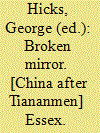

|
|
|
|
|
| Publication |
Essex, Longman, 1990.
|
| Description |
xxv, 526p.hbk
|
| Standard Number |
0582074851
|
|
|
|
|
|
|
|
|
|
|
|
Copies: C:1/I:0,R:0,Q:0
Circulation
| Accession# | Call# | Current Location | Status | Policy | Location |
| 032654 | 951.059/HIC 032654 | Main | On Shelf | General | |
|
|
|
|
| 2 |
ID:
029695
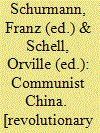

|
|
|
|
|
| Publication |
Haramondsworth, Penguin Books, 1967.
|
| Description |
xxxiii, 647p.pbk
|
| Series |
China Readings; 3
|
|
|
|
|
|
|
|
|
|
|
|
Copies: C:1/I:0,R:0,Q:0
Circulation
| Accession# | Call# | Current Location | Status | Policy | Location |
| 001791 | 951.05/SCH 001791 | Main | On Shelf | General | |
|
|
|
|
| 3 |
ID:
117723
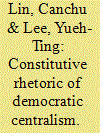

|
|
|
|
|
| Publication |
2013.
|
| Summary/Abstract |
Employing the theoretical framework of constitutive rhetoric, this paper explores Chinese conceptions of democracy by examining Mao Zedong's speeches and writings. This rhetorical examination seeks to show how democracy is understood, defined, and conceptualized in China. Several themes from Mao's most famous speeches and writings are discussed in the light of his concept of democratic centralism. The rhetorical analysis supports the notion that Chinese communism includes democracy, as purported by Mao; however, this culturally unique form of democracy (i.e. democratic centralism) does not match the representative form of democracy employed in the West. Understanding that democracy is conceptualized distinctly by Chinese communist followers of Mao may provide insight for future international studies and relations.
|
|
|
|
|
|
|
|
|
|
|
|
|
|
|
|
| 4 |
ID:
102325


|
|
|
| 5 |
ID:
045391
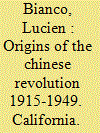

|
|
|
|
|
| Publication |
California, Standford University Press, 1971.
|
| Description |
xiii, 223p.Hbk
|
| Standard Number |
196903963
|
|
|
|
|
|
|
|
|
|
|
|
Copies: C:1/I:0,R:0,Q:0
Circulation
| Accession# | Call# | Current Location | Status | Policy | Location |
| 009541 | 951.04/BIA 009541 | Main | On Shelf | General | |
|
|
|
|
| 6 |
ID:
038703
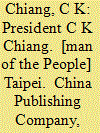

|
|
|
|
|
| Publication |
Taipei, China Publishing Company, 1978.
|
| Description |
64p.:images.Hbk
|
|
|
|
|
|
|
|
|
|
|
|
Copies: C:1/I:0,R:0,Q:0
Circulation
| Accession# | Call# | Current Location | Status | Policy | Location |
| 021471 | 923.151/CHI 021471 | Main | On Shelf | General | |
|
|
|
|
| 7 |
ID:
038704
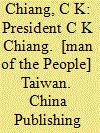

|
|
|
|
|
| Publication |
Taiwan, China Publishing Company, 1978.
|
| Description |
64p.Hbk
|
|
|
|
|
|
|
|
|
|
|
|
Copies: C:1/I:0,R:0,Q:0
Circulation
| Accession# | Call# | Current Location | Status | Policy | Location |
| 017730 | 923.151/CHI 017730 | Main | On Shelf | General | |
|
|
|
|
| 8 |
ID:
099701
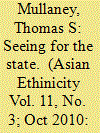

|
|
|
|
|
| Publication |
2010.
|
| Summary/Abstract |
This article proposes a new understanding of the Ethnic Classification project (minzu shibie) undertaken in China's southwesternmost province of Yunnan in 1954 - a project in which social scientists and Communist Party cadres set out to determine which of the dozens, if not hundreds, of minority communities in the province would be officially recognized by the state. Specifically, this article argues that ethnologists and linguists played a far greater role in the Classification and early Chinese Communist governmentality than is typically assumed. The Chinese Communists did not teach themselves how to 'see like a state,' to use James Scott's formulation, at least not when it came to the fundamentally important problem of ethnic categorization. To the contrary, the history of the Classification project is one of an inexperienced Chinese state that was able to orient itself only by observing the world through the eyes of its social scientific advisors. The 'mentality' within early Chinese Communist Party (CCP) 'governmentality' was, in the case of the 1954 Ethnic Classification, in large part the mentality of the comparative social sciences.
|
|
|
|
|
|
|
|
|
|
|
|
|
|
|
|
| 9 |
ID:
042613
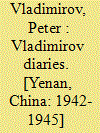

|
|
|
|
|
| Publication |
London, Robert Hale, 1975.
|
| Description |
544p.Hbk
|
| Standard Number |
0-7091-5732-0
|
|
|
|
|
|
|
|
|
|
|
|
Copies: C:1/I:0,R:0,Q:0
Circulation
| Accession# | Call# | Current Location | Status | Policy | Location |
| 025506 | 951.042/VLA 025506 | Main | On Shelf | General | |
|
|
|
|